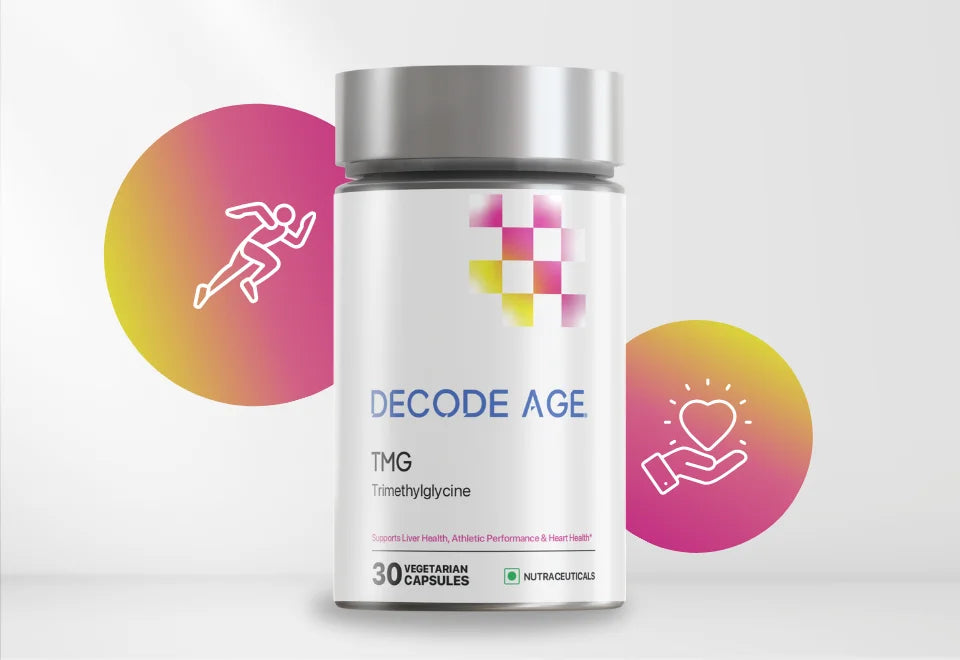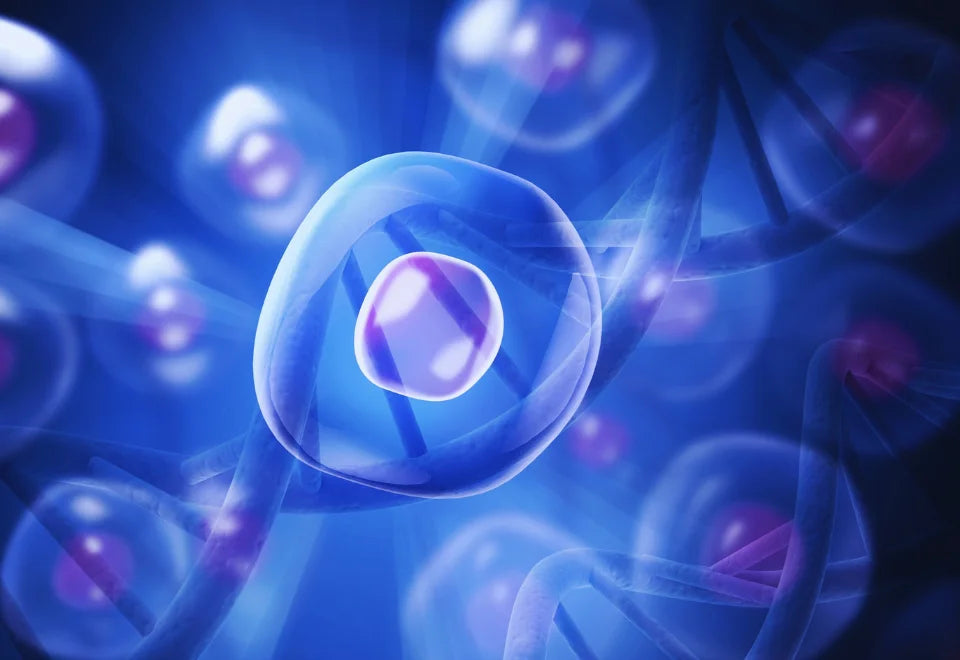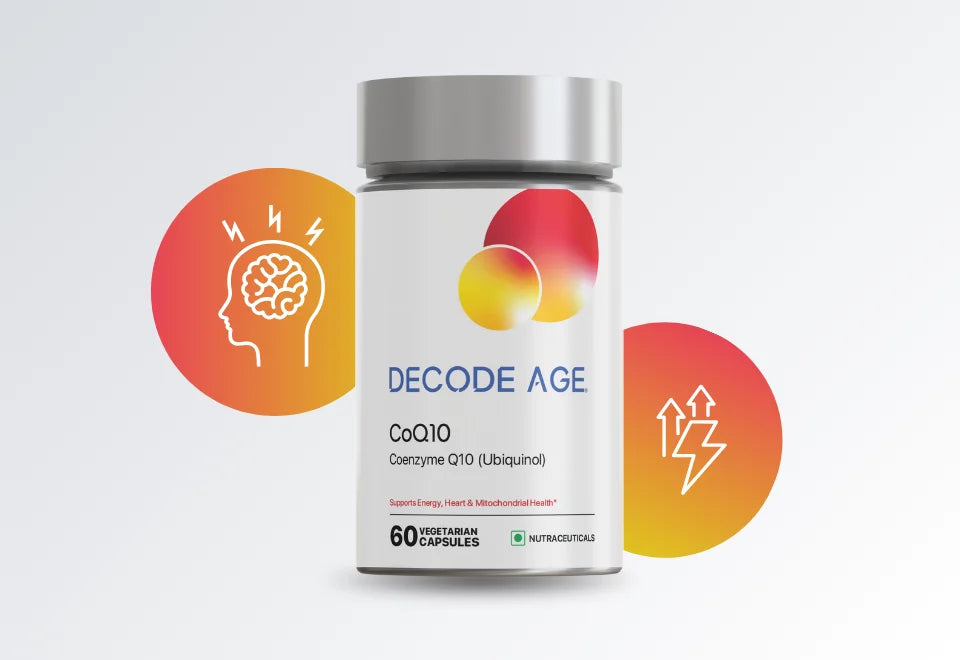TMG, also known as Trimethylglycine, occurs naturally in the human body and certain foods like beetroot. Additionally, it can be found in supplement form, and its popularity stems from its involvement in diverse bodily functions. With age, the methylation efficiency and methyl reserves are depleted. TMG’s benefits involve replenishing these methyl reserves, aiding in diverse cellular and bodily functions.
What Role Does Methylation Play in the Ageing Process?
Research indicates that as individuals age, there's a tendency for methylation patterns within gene expression areas to rise. This elevation can modify gene expression and consequently impact cellular functions. One significant illustration involves the control of telomeres, the protective ends of chromosomes. With age, telomeres naturally shorten, a process linked to various age-related ailments. Methylation is pivotal in governing telomere length, and alterations in methylation patterns may accelerate telomere shortening, thus promoting premature ageing.
Health Benefits of TMG
The potential health benefits of TMG supplementation include:
Enhance Methylation Support
TMG benefits include playing a critical role in methylation, a process that adds a methyl group (CH₃) to DNA and other molecules. As a derivative of glycine, Trimethylglycine benefits come from its ability to donate methyl groups, which support key functions like gene activity and energy. Methylation regulates essential processes such as gene expression, cellular repair, detoxification, energy production, and nervous system function.
Lowers Homocysteine Levels
Trimethylglycine benefits extend to cardiovascular protection by potentially lowering the risk of heart disease. Research shows that TMG may lower homocysteine levels, a harmful amino acid linked to heart disease and stroke risk. In addition, TMG benefits include boosting nitric oxide production, which widens blood vessels and improves circulation. This improved blood flow enhances exercise performance by delivering more nutrients and oxygen to muscles and aiding in waste removal.
Improves Athletic Performance
TMG offers numerous advantages that render it appealing as a supplement for athletes. Initially, it boosts the body's creatine production, crucial for muscle strength and energy, thereby enhancing performance in activities demanding high intensity, like weightlifting or sprinting. Moreover, TMG enhances blood circulation and oxygen supply to muscles, aiding endurance and overall performance. Furthermore, it reduces fatigue and muscle soreness post-workout, facilitating faster recovery and enabling athletes to train more intensely.
Insulin Sensitivity
Insulin sensitivity refers to the level of responsiveness of the body's cells to insulin, a hormone vital for controlling blood sugar levels. In individuals with insulin resistance, cells exhibit reduced responsiveness to insulin, causing elevated blood sugar levels and heightened susceptibility to type 2 diabetes.
Studies indicate that trimethylglycine benefits may include increased insulin sensitivity by promoting the production of S-adenosylmethionine (SAMe), a key compound in insulin signaling and glucose metabolism.
The Synergy of TMG and NMN
NMN depends on methyl groups for its proper operation, and TMG assists in replenishing these methyl groups. NMN is transformed into nicotinamide (NAM), which undergoes further methylation to facilitate its excretion through urine. The process of converting NMN to NAM requires methylation, potentially depleting methyl groups. Hence, supplementing NMN with TMG proves to be an efficient approach to counteracting this depletion.
NMN acts as a precursor to NAD+, a coenzyme essential for DNA repair and energy production within cells. NMN works synergistically with TMG, enhances the methylation process, and provides additional health benefits.
Through its support of methylation, NMN guarantees a sufficient SAMe supply, which is necessary for activating sirtuins and PARPs. These genes, known for promoting longevity, are vital in governing cellular functions and have been associated with extended lifespan and enhanced overall health.
Dosages and Guidelines
Dosage: TMG has been studied in doses ranging from 500–9,000mg per day in healthy adults. Decode Age TMG contains 500 mg, which is a lower dosage and is considered safe for daily consumption.
Timing
- When TMG is Taken with NMN: For optimal results, take TMG in the morning if it is paired with nicotinamide mononucleotide (NMN). This combination has shown promising effects on ageing and related conditions.
- If TMG is Taken Alone: If you are taking TMG without NMN, it is advisable to take it in the morning after breakfast.
Who Should Avoid Taking TMG?
TMG should not be used by individuals under 18 years of age or by pregnant or breastfeeding women. It is advisable to seek advice from your doctor before taking this supplement if you have bleeding disorders or are currently taking medications.
What are the Possible Side Effects of Taking TMG?
Although TMG is typically deemed safe for consumption, it can induce several side effects in certain people. The primary adverse reactions linked to TMG include gastrointestinal discomforts such as bloating, cramps, indigestion, nausea, vomiting, and diarrhoea. Additionally, some individuals might encounter mild headaches.
Conclusion
Adding TMG and NMN supplements can offer substantial advantages for your general health and wellness. TMG’s benefits include facilitating efficient methylation, while NMN aids in activating genes associated with longevity. When combined, these compounds synergize to enhance methylation and deliver further health advantages. Remember to consult your healthcare professional before introducing any new supplements into your routine.
FAQs
What is Trimethylglycine used for?
Trimethylglycine, also known as betaine or betaine anhydrous, serves various purposes in the body. It plays a crucial role in liver function, supports cellular reproduction, and contributes to the production of carnitine. Additionally, Trimethylglycine aids in the metabolism of homocysteine, an amino acid, thereby promoting overall metabolic health. With age, the methylation efficiency and methyl reserves are depleted. TMG helps replenish these methyl reserves, aiding in diverse cellular and bodily functions.
Does TMG increase Testosterone?
Yes, TMG can increase testosterone. A study found that young athletes who took TMG supplements experienced higher testosterone levels. It also didn't have any negative effects on their growth and might help prevent decreases in testosterone caused by intense training during adolescence.
Is TMG Anti-Ageing?
Yes, TMG can contribute to anti-ageing effects when used alongside NMN. NMN boosts NAD+ levels, which relies on methylation—a process TMG supports. Together, NMN and TMG provide an effective way to activate and sustain anti-ageing mechanisms and epigenetic regulation in our bodies.
Does TMG increase Nitric oxide?
Yes, taking TMG can boost nitric oxide levels in your blood. Nitric oxide helps widen blood vessels, which enhances blood flow to muscles during brief workouts. This increased blood flow can improve exercise performance by delivering more nutrients to muscles and removing waste more efficiently.
What are the main benefits of TMG?
TMG benefits include supporting healthy methylation, reducing homocysteine levels (which supports heart health), improving insulin sensitivity, boosting athletic performance, and enhancing energy metabolism. It also works well with NMN to support anti-ageing and longevity by maintaining methyl group balance in the body.
























Leave a comment
All comments are moderated before being published.
This site is protected by hCaptcha and the hCaptcha Privacy Policy and Terms of Service apply.